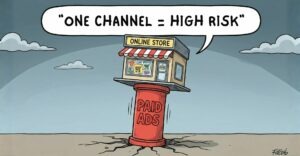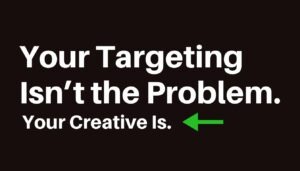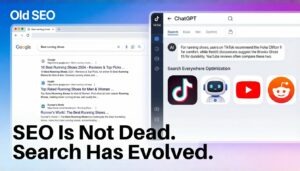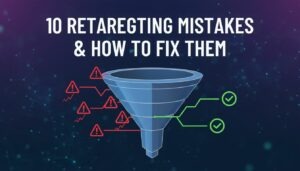That’s money walking out the door. Or not even know where your door is located.
Local SEO strategy in 2025 isn’t what it used to be. Sure, your Google Business Profile still matters (more than ever, actually). But between AI overviews eating up search results and customers expecting instant, hyper-local answers, just claiming your listing isn’t enough anymore.
While everyone’s obsessing over ChatGPT and AI, Google’s quietly revolutionized how local search works. And most service-based businesses? They’re still optimizing like it’s 2019.
The good news? That’s exactly why this local SEO checklist can put you miles ahead. Because when your competitors are still stuffing keywords into their homepage, you’ll be doing what actually moves the needle in 2025.
Why Local SEO Still Matters in 2025
AI summaries. Voice search. Google’s endless algorithm updates. With all the noise about what’s “changing everything” in search, what matters for local businesses is that people still need their pipes fixed, their hair cut, and their taxes done. And they’re still turning to Google to find who can help them. Today.
The difference in 2025 is those “near me” searches are how most local customers find businesses now. We’re talking 80% of mobile searches with local intent converting into actual visits or calls within 24 hours.
Think about your own behavior. Water heater dies on a Sunday? You’re not researching the history of plumbing. You’re typing “emergency plumber near me” and calling whoever shows up first with decent reviews.
That’s the beauty of local SEO for service-based businesses…you don’t need to compete with Fortune 500 companies for generic terms like “lawyer” or “restaurant.” You need to show up when someone in YOUR city needs what you offer RIGHT NOW. Different game, way better odds.
And while everyone’s panicking about AI taking over search? Google Business Profile results still dominate local searches. That map pack at the top is still prime real estate. And those local reviews are still driving decisions.
In short, Local SEO still matters. Now, here’s how to do it right.
What’s New in Local SEO for 2025
Two years ago, you could slap up a Google Business Profile, get 10 reviews from your regulars, and call it good. That playbook’s dead.
Here’s what’s moving the needle now:
1. Your Google Business Profile IS Your Homepage (Seriously)
Most customers won’t even hit your website anymore. They’re booking, calling, and deciding straight from your GBP. Google keeps adding features like Posts, Q&A, service menus, even direct booking for some industries. If you’re treating your profile like a yellow pages listing, you’re already behind.
2. AI Summaries Are Eating Traditional Results
See those AI-generated answers at the top of search? They’re pulling from somewhere – usually the businesses with the most complete, consistent information across the web. Incomplete profile? Inconsistent NAP data? You’re not making it into those summaries.
3. Reviews Got Smarter (And Google Knows When You’re Faking It)
It’s not about having 500 five-star reviews anymore. Google’s looking at the actual words in your reviews, how recent they are, whether you respond, and if the reviewers seem… real. Three authentic reviews mentioning “emergency water heater repair” beat 50 generic “great service!” reviews every time.
4. People Aren’t Clicking Through Anymore
Zero-click searches – where users get their answer right in Google – hit 65% this year. Your business hours, services, prices, FAQs? They better be front and center in your GBP, because that might be all potential customers ever see.
Ignore these changes at your own risk. But master them? You’ll dominate “near me” searches while your competition is still trying to figure out what happened to their traffic.
Core Local SEO Strategies for 2025
Forget the fancy stuff for now. If you don’t have these basics locked down, nothing else matters. Most local businesses are trying to run before they can walk, meanwhile, the plumber who just nails these fundamentals is cleaning up in local search.
1. Optimize Your Google Business Profile
This isn’t a “set it and forget it” situation anymore. Your GBP needs constant attention:
- NAP consistency: Your name, address, phone number better match EVERYWHERE online. One typo can tank your rankings.
- Services with local intent: Don’t just list “plumbing.” List “emergency plumbing in [neighborhood],” “water heater repair [city],” “24/7 burst pipe service [area]”
- Weekly posts: Yeah, weekly. Share a quick tip, a before/after photo, a seasonal reminder. Google rewards active profiles.
- Fresh photos monthly: Not stock photos. Real pics of your work, your team, your storefront. Videos are even better.
Example: A Miami dentist started posting weekly oral health tips and monthly staff spotlights. Nothing fancy, iPhone photos, two-sentence posts. Six months later? 40% more calls straight from their GBP. Not because they’re marketing geniuses. Because they showed up consistently while their competitors posted once and disappeared.
2. Do Local Keyword Research
Stop guessing what your customers search for. They’re not using the terms you think they are.
Your customers don’t search “premier dental solutions.” They search “tooth pain emergency dentist open Sunday.” See the difference?
Here’s how to find what they’re typing:
- Google’s autocomplete is free intel: Type your service + your city and watch what Google suggests. Those are real searches.
- Check your Google Business Profile insights: It literally tells you what searches triggered your listing. Use those exact phrases.
- Think problem-first, not service-first:
- Not “HVAC services Boston” – “AC not working Boston heat wave”
- Not “legal representation Chicago” – “divorce lawyer Chicago child custody”
- Not “logistics solutions LA” – “last minute movers Los Angeles weekend”
The money’s in those ugly, specific long-tail searches. “Emergency plumber burst pipe Sunday Boston” might only get 20 searches a month, but guess what? All 20 of those people are ready to pay RIGHT NOW.
3. Create Location & Service Pages
Do you have one “Services” page listing everything you do? That’s not going to cut it. You need specific pages for specific searches.
If you’re a landscaping company covering Dallas-Fort Worth, you don’t need one page trying to rank for everything. You need:
- “Lawn Care in Plano TX” (not just “lawn care”)
- “Tree Trimming Frisco” (not just “tree services”)
- “Sprinkler Repair McKinney” (not just “irrigation”)
But here’s the catch, don’t just swap out city names like a mail merge. Google sees right through that lazy stuff. Each page needs:
- Actual information about serving that area (parking challenges downtown, HOA requirements in that suburb, local soil conditions)
- Real photos from jobs in that location
- Reviews from customers in that specific area
- Driving directions from local landmarks
One roofing company we know built 15 location pages this way. Not fancy, just honest, specific content about fixing roofs in each suburb they served. Six months later? First page for “[suburb] roof repair” in 12 of them. Their competition? Still running one generic “Areas We Serve” page.
4. Build & Manage Reviews
Still sending that generic “please review us” email? That’s why you’re stuck at 12 reviews from 2019.
Getting reviews in 2025 requires an actual system:
- Strike while the iron’s hot: Don’t wait a week. Text them the review link while they’re still happy you fixed their problem.
- Make it stupid easy: Direct Google review link. Not “find us on Google.” Not your website. The actual write-a-review screen.
- Ask the right customers: Just finished a big job? Saved someone’s weekend? Customer said “you’re a lifesaver”? Those are your reviewers. Not everyone. The thrilled ones.
But here’s what separates winners from everyone else: responding to reviews.
Bad review? Respond within 24 hours. Not with corporate speak. Like a human who actually cares about fixing the problem.
Good review? Don’t just say “thanks!” Mention their name, reference the specific service, add keywords naturally. “Thanks Sarah! Glad we could get your AC running before the heat wave hit Dallas.”
5. Get Local Backlinks
Forget chasing high-authority sites that’ll never link to your plumbing business. Local links from real community sites beat generic directory spam every time.
Here’s what actually works:
- Sponsor something small and local: Little League team, school fundraiser, charity 5K. $500 gets you a permanent “thank you” page link that’s worth more than 100 directory submissions.
- Be the expert for local reporters: Email your local news station: “I’m a roofer, happy to comment on storm damage for future stories.” Become their go-to quote, get links every time.
- Partner with complementary businesses: Plumber? Team up with a water damage restoration company. Real estate agent? Partner with home inspectors. Guest post on each other’s sites about what to look for.
The Chamber of Commerce membership? Sure, grab it. But don’t stop there. Local business associations, neighborhood Facebook groups that have websites, community event pages, these “small” local links tell Google you’re actually part of the community, not just claiming to serve it.
6. Publish Local Content
“Content marketing” sounds fancy. It’s not. It’s just proving you work in your city. Write about what you know, your city and your service:
- Seasonal local problems: “Why Houston AC Units Fail in August” beats generic “AC Maintenance Tips”
- Local event tie-ins: “Catering Options for ACL Festival Parties” if you’re an Austin restaurant
- Neighborhood-specific guides: “Dealing with Old Plumbing in Victorian District Homes”
- Local cost guides: “What Does Bathroom Remodeling Cost in Phoenix?” (with actual local factors like permit costs)
Don’t overthink it. That plumber who wrote “Why Denver Pipes Freeze Even in October” got more traffic than any generic plumbing guide ever would. Why? Because every Denver homeowner has wondered the same thing.
The secret is write for your actual customers, not Google. Answer the questions they ask you every day. That landscaper who blogs about “Dealing with HOA Landscape Requirements in Plano”? They’re booked solid. Not because they’re SEO masters. Because they’re the only ones talking about what their customers actually care about.
One blog post a month about something local and specific beats 10 generic posts nobody reads.
Common Local SEO Mistakes to Avoid
Even experienced business owners can stumble here. Sometimes, the very strategies meant to improve your visibility can backfire if executed poorly. Inconsistent contact information, ignoring mobile optimization, or letting reviews sit unanswered can erode your credibility faster than you think. Avoiding these mistakes is just as critical as implementing the right tactics because trust in local search is fragile, and once lost, it’s hard to regain.
- Inconsistent NAP across the web: Your name, address, or phone number varies even slightly across directories? Google loses confidence in your business data. That confusion translates directly to lower rankings.
- Ignoring mobile experience: With most local searches happening on smartphones, a site that isn’t mobile-optimized isn’t just inconvenient – it’s actively pushing customers to competitors who got this right.
- Abandoning your review strategy: Stale reviews from years ago signal a business that’s either closed or indifferent. Neither impression helps your local SEO for service-based business goals.
- Forgetting seasonal GBP updates: Holiday hours, temporary closures, seasonal services – miss these updates and Google might mark you “permanently closed” or serve outdated information right when customers need you most.
- Flying blind without tracking: Not measuring which searches find you or where calls originate means you can’t identify what’s working. You’re essentially gambling with your local SEO strategy 2025.
Future-Proofing Your Local SEO
The businesses still thriving in five years won’t be the ones who mastered today’s algorithm. They’ll be the ones who built something algorithm-proof.
Voice search is already eating traditional search. AI summaries are replacing click-throughs. And Google keeps finding new ways to answer questions without anyone visiting your site. You can fight these changes, ignore them, or get ahead of them.
Smart money’s on getting ahead.
- Voice Search Optimization: People don’t type how they talk. They type “plumber Boston.” They ask their phone “Who’s the best plumber near me who can come today?” Your content needs to answer natural questions, not just target keywords.
- AI-Friendly Content: Structure your information for easy extraction. Clear headings, direct answers, FAQ sections. When Google’s AI needs a quick answer about “emergency plumber rates in Boston,” make sure your content is the obvious source to pull from.
- Community Engagement: Your offline reputation becomes online authority. That charity event you sponsored, the local business group you joined, the community Facebook page where you answer questions – these create the authentic local signals that no amount of SEO tricks can fake.
The businesses dominating local search in 2025 are building real local presence that will matter regardless of what algorithm changes come next.
Your Local SEO Game Plan Starts Now
Look, you could try to manage all this with spreadsheets and sticky notes. But that’s a great way to burn out by February (and we’re talking about starting in January).
The smart tools, review management platforms, rank trackers, citation monitors, aren’t luxuries anymore. They’re the difference between spending your Saturdays updating directory listings and running your business. Set them up once, let them work while you sleep.
If you’re still left scratching your head, let’s break it down simply. Local SEO means being findable when someone needs you NOW. Not tomorrow. Not after they’ve called three competitors. Right when their pipe bursts, their tooth hurts, or they finally decide to remodel that ugly bathroom.
The businesses crushing local search aren’t playing 4D chess with Google. They’re just doing the basics consistently while everyone else does them halfway, sometimes, or not at all.
You don’t need the biggest budget. You don’t need a marketing degree. You just need to be more visible, more credible, and more present than the business down the street.
Start with your Google Business Profile this week. Fix one thing. Then another. Six months from now, while your competitors are still “meaning to get around to it,” you’ll be the one showing up first when your city searches for what you do.
Need help making this happen? If you’d rather focus on running your business while someone else handles your local SEO, let’s talk. DTS helps local businesses dominate their markets without the headache. Contact us for a free local SEO audit and see exactly where you’re leaving money on the table.
FAQL: Local SEO in 2025
Depends who you’re up against. If your top competitor has 200 reviews, your 10 aren’t cutting it. Most local businesses need at least 50 recent reviews to be taken seriously. But here’s the thing – 30 detailed, keyword-rich reviews beat 100 generic “great service!” reviews every time.
That’s like asking if you should eat vegetables or exercise. They do different jobs. Ads get you customers today, SEO gets you customers forever. Smart businesses do both. Use Ads while you’re building SEO, then let SEO carry the load long-term.















